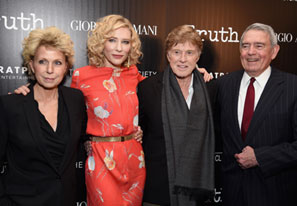
The film that opens this weekend’s Hamptons International Film Festival is Truth—based on former 60 Minutes producer Mary Mapes’s memoir on the scandal that cost her and Dan Rather their jobs at CBS. As will be evident to anyone with even a passing familiarity with “Rathergate,” the story is falsified history at its most audacious. Far from the fearless, crusading journalist presented in the book and film, Mapes was a liberal partisan who had long been out to nail President George W. Bush, even if it took phony documents to do so. As Powerline’s John Hinderaker and Scott Johnson observe, “Mapes was fired for appalling professional misconduct, which disgraced her colleagues (including Rather) and the company for which she worked.” Think what Mary McCarthy said about Lillian Hellman, another self-aggrandizing leftist fantasist: “Every word she writes is a lie, including ‘and’ and ‘the.’”
No matter. Since the audience that will pack the film’s three sold-out East Hamptons showings is the left/liberal elite in microcosm, Truth will generate only enthusiasm and praise. Ever wonder about that diminishing percentage of people who still believe Hillary on the e-mails and answer “yes” when asked the “honest and trustworthy” question? Same people.
Yet in its fundamental worldview, Truth isn’t all that different from a great many of the other 133 films on offer at the festival. Whether features or documentaries, products of Hollywood studios or foreign independents, they reflect a smugly confident left-of-center sensibility. Indeed, for those interested in the ways movies have steadily nudged the culture leftward, a cursory review of the listings in the festival catalogue makes for depressing (yet oddly entertaining) reading. There are the movies on the evils of capitalism or income inequality; those promoting environmentalism or pushing criminal-justice reform; the ones lauding particular social-justice warriors for “exposing” some misdeed, fighting “the system,” or generally evincing “fury in the face of injustice.” Needless to say, these movies are ready to remind us that war is bad—and so is child molestation, especially within the Catholic Church. (“As old demons are brought to light, the priests are forced to bear the weight of their transgressions . . .”).
The catalogue boasts a whole section labeled “Films of Conflict & Resolution.” You will not be surprised to learn that among the films the 12-person Conflict & Resolution Advisory Board recommended is one about “a brave evangelical minister who questioned whether someone could be both pro-life and pro-gun.” The catalogue also has a section on films devoted to “Compassion, Justice & Animal Rights.” Its biggest draw appears to be the documentary about the “group of journalists, scientists and hippies (who) set sail on a mission to prevent American atomic tests” and end up founding Greenpeace.
Oddly, the Colombian film about “the ravages of colonialism that have destroyed the harmony and balance at the heart of the indigenous way of life” (in “Spanish, Portuguese, German, Catalan and Latin”) is in neither of those sections, appearing instead with the film that offers “a rare and unsettling look into the rise of xenophobia in France”; the one offering “a complex portrait of immigration with both urgency and a humanist approach to understanding life on the margins”; and the one in which “a gay California teenager . . . agrees to act ‘normal,’ but nonetheless attracts some unwanted attention from his conservative relatives.”
Oh, Dan Rather will be on hand to promote Truth. Michael Moore will also make an appearance. So will British-born actress Emily Blunt, last heard commenting that taking American citizenship was “a terrible mistake.” Even many of the films that have no evident ideological agenda are informed by the joyless left/liberal worldview, where everyone who’s not a victim or an oppressor is too despondent to care either way. These are the ones featuring addiction (Kirsna “will face her family for Thanksgiving because she is sober and she is ready”) and those with protagonists “crippled by the mundanity” of contemporary life who “examine the visceral and isolating experience of grief,” where people grow old in painful isolation. And there’s the one about PTSD: “Disordered by paranoia and anxiety, Vincent obsessively looks for danger in every corner of the seemingly peaceful home.”
Am I exaggerating? Okay, maybe a little. But, trust me, I searched in vain for a film that promised to be upbeat, possibly even amusing. No luck. And I long ago hoped to run across a true-life tale that might deviate from the liberal narrative on any seriously contentious issue. A big-screen feature on the Duke lacrosse case, with the unjustly accused white kids and their lawyers cast as heroes, and the Duke faculty and mainstream press as the villains? You kidding? About as likely as a positive film portrayal of Richard Nixon.
I did see one film that just might possibly be up my alley—a documentary called Chuck Norris vs. Communism, about the impact of Western films smuggled into pre-revolutionary Romania. But no need to rush out for tickets to that one. I’m told there are still tons available.



